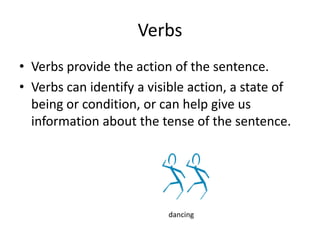Verbs
- 1. Verbs provide the action of the sentence. Verbs can identify a visible action, a state of being or condition, or can help give us information about the tense of the sentence.Verbsdancing
- 2. Verbs can convey a state of being or condition by linking the noun with the adjective.His pockets appeared empty.Verbs can also link nouns.John became a teacher. Verbs
- 3. Verbs can also enhance a sentence’s meaning by providing more information about the tense.These are called auxiliary verbs: am, is, are, was, were, be, do, does, did, have, had, has, may, might, must, shall, will, can, should, would, could, ought.The cafeteria will serve pizza for lunch.I could stay after school for extra help.Verbs
- 4. Identify the verb phrases in the following sentences.Steven and Craig must have had permission to leave early.Missy should vacuum the carpet before she dusts the furniture.The remote control must have fallen behind the sofa.Jesse will not be going to soccer practice this afternoon.The weatherman thinks it might snow tomorrow afternoon. Let’s Practice!
- 5. Steven and Craig must have had permission to leave early.Missy should vacuum the carpet before she dusts the furniture.The remote control must have fallen behind the sofa.Jesse will be going to soccer practice this afternoon.The weatherman thinks it might snow tomorrow afternoon. How did you do?
- 6. There are three verb tenses that tell us when something is going to happen or if it already has happened: present, past, future.These tenses can be subdivided into three categories: simple, progressive, and perfect.Verb Tenses
- 7. Present tense tells us that the action happens on a regular basis.We go to school every morning.Past tense tells us that the action has already happened.He broke his leg.Future tense tells us that the action will happen.I will dance in the recital on Friday. Simple
- 8. Present progressive tense tells us that the action is in progress.Jill is writing a letter.Past progressive tells us that the action has happened at some specific time in the past.George was playing in the football game last Saturday.Future progressive tells is the action is continuous or will occur in the future. Lauren will be attending the party on Friday night. Progressive (ing)
- 9. Present perfect tense indicates that the action had started in the past and is ongoing into the present time.Chris had cleaned all day.Past perfect tense indicates that the action had occurred in the past before another action was begun.Justin had gotten home before the snowstorm hit.Future perfect tense indicates an action that will occur and finish in the future before another action has begun.Kayla will have graduated high school before going to college. Perfect
- 10. Irregular verbs do not follow a predictable pattern change tense. There are many irregular verbs in the English language. So, if you are unsure, consult your grammar book or a dictionary. Irregular Verbs









